- Home
- Barbara W. Tuchman
The Zimmermann Telegram Page 5
The Zimmermann Telegram Read online
Page 5
This inside story, circumstantial, dramatic, and supported by the Sun’s prestige, convinced the public that Mexico was to be Japan’s invasion base. The Yellow Peril became as popular as the turkey trot, creating in the American mind a special sensitivity to alarums from over the border that was to last for some years.
What did Ambassador Wilson, the only man who could have scotched the story, have to say? Publicly, nothing. Privately he told the State Department that no secret treaty had ever been placed in his hands. He told them something else. Mr. Ritchie, the Sun’s special correspondent, had admitted to him having written the famous article entirely from information supplied by (as the clever reader will instantly have guessed) Major Herwarth von Bittenfeld.
It was, of course, a German invention. The fact is that President Taft mobilized the American Army to foil not a Japanese threat to American territory but an internal Mexican threat to American business from the increasingly menacing insurrection. Ambassador Wilson’s hurried trip north and Taft’s response were made in the hope of overawing the rebels and of bolstering the Díaz regime, not overthrowing it. They had no intention of invading Mexico and, though it was unfeeling of them to disappoint the Kaiser, did not cross the border.
Whether there ever was a secret Japanese treaty with Mexico, or von der Goltz ever stole it, is unresolved but irrelevant. For the purposes of history, what actually happened is less determining of later events than what people think happened. Germany had succeeded not only in making Americans believe in the possibility of joint Japanese-Mexican action against the United States but in making herself believe in it. So the pit was dug for Zimmermann.
Meanwhile the Kaiser still itched for Latin American adventure and was soon to try again. The insurrection in Mexico, already lapping at Díaz’s boots, gave him his next opportunity.
Three
“Seize the Customs House at Once!”
WHEN FRANCISCO MADERO, leader of the revolution that broke the iron grip of Porfirio Díaz in 1911, rode in to the capital on a white horse, the peons hailed him as Mexico’s apostle and redeemer, but the old regime, priming its guns, crouched for a counterattack. It came in less than two years, all the time that Madero was given to try to graft democracy on the trunk of feudalism. After ten days of terror and bombardment ten thousand were dead and Mexico had a new iron man who, behind the blood and cannon smoke, had made his spring to power. He was General Victoriano Huerta, a pure-blooded Indian with a flat nose, a bullet head, a sphinx’s eyes behind incongruous spectacles, and a brandy bottle never far from hand. Wily, patient, laconic, and rarely sober, he had risen carefully through the Army, step by step, to its command, serving under both Díaz and Madero, whom he now betrayed and arrested. Gratefully the ruling class and foreign investors welcomed him as their redeemer.
Two weeks after Huerta’s coup, during the night of February 22, 1913, Madero and his Vice-President, Pino Suárez, while being moved under guard from house arrest in the National Palace to the National Prison, were assassinated—murdered, the world believed, on Huerta’s orders, though no evidence was ever found to prove his direct complicity.
History chose this precise moment to inaugurate Woodrow Wilson as the new President of the United States. In his way he too was an apostle, not a messiah like Madero, but rather a Luther, intent upon a reformation, schooled, incorruptible, and sure of his purpose, mandated by himself as by the electorate to sweep out the old iniquities and the new greeds and redeem the level of American politics. Reform was what the time demanded, and reform was the device on Wilson’s banner. With him he brought into office other devotees of the New Freedom, among them William Jennings Bryan, the most improbable Secretary of State America ever had, and Josephus Daniels, a pacifist, as Secretary of the Navy. To them, as to Wilson, General Huerta was everything that was abhorrent. Yet Wilson, in the long duel with Huerta that was to follow, could not suppress a “sneaking admiration” for his opponent’s nerve. Fulminating publicly, privately he confessed to finding Huerta “a diverting brute … so false, so sly, so full of bravado, yet so courageous … seldom sober and always impossible yet what an indomitable fighter for his own country.” To Huerta, a man of few words, Wilson was simply the “Puritan of the North.”
The murder of Madero, a reform president like himself, occurring only a few days before his own inaugural, brushed Wilson almost too closely and shocked him inexpressibly. It need not have, since hardly a ruler of Mexico in a hundred years had failed to die a violent death, but Wilson felt Madero’s death like a brother’s. Perhaps a sense that it might have been his own added to his indignation. From the day he took office on March 4, 1913, he was obsessed by the idea that it was his “clear duty” as a knight of the New Freedom and foe of the “Interests” to tear General Huerta, the “usurper,” off the backs of the Mexican people. He determined that Mexico should be ruled by the consent of the governed and that it somehow devolved upon him to accomplish this goal.
Just at this time Japan was aroused to fury when California passed a law forbidding Japanese nationals to own or lease land in that state. Unable to believe that the federal government was powerless to abrogate a state law, and convinced that the action was a deliberate insult, Japan protested hotly to Washington. The air over the Pacific became electric with tension; the long-predicted war seemed about to break.
Wilson, bursting with plans for domestic reforms, for busting the trusts, breaking the “interlocking directorates,” driving the dollar diplomats from the temple, had hardly got inside the White House door before he was confronted by possible war with Japan and a major crisis in Mexico. “It would be the irony of fate,” he said wistfully, “if my administration had to deal chiefly with foreign affairs”—a remark which fate, in a malicious mood, promptly proved the understatement of the era.
At such a moment, when fresh rumors were circulating that Japan was even then offering a secret alliance to Mexico, a less high-principled man than Wilson would not have risked throwing Mexico into Japanese arms by simultaneously weakening and alienating the Mexican government. But Wilson’s peculiar strength, as well as his ultimate weakness, was that, conscious of the purity of his motives, he unwaveringly pursued what he believed was right, regardless of expediency. He spurred against “that scoundrel Huerta,” determined to unseat him with the weapon of non-recognition. Withholding recognition from Huerta naturally encouraged the rise of a rival in the person of General Carranza, who had already got an insurrection going in the north, near the American border. His forces now spread southward, swelling daily, set up a rival government, and made of Mexico a Latin American Balkans inviting foreign intrigue. With both parties seeking guns, money, and other forms of support from abroad, Mexico was opened to any enterprising trouble shooter with an eye for a crack in the Monroe Doctrine.
More than one was watching for the right moment. Japan, in that summer of 1913, gladly sold Huerta a fat pack of arms and, to annoy Wilson the more, requested a special mission, which arrived in the person of Señor de la Barra, Mexico’s Foreign Minister, who was personally received by the Emperor and made the object of cheering demonstrations. Germany’s expectations of trouble warmed up at once. It looked as if the long-bruited alliance of Japan and Mexico was really taking shape. Mexico had two thousand miles of undefended coastline on the Pacific. Her northern border with the United States stretched for twelve hundred miles from Texas to California, touching all along its length against territory that had once been her own. Mexicans remembered the Alamo too. Mexico was, in short, the soft underbelly of the United States.
President Wilson, however, was not concerned with strategy but with reform. Seduced by the magic of the word “Constitutionalists,” which Carranza chose for his party, or perhaps by the nobility of Carranza’s long white beard, which made him look like a combination of John Brown and the prophet Isaiah, Wilson believed he saw in him a new leader of the oppressed. This was the man for Mexico, he decided, on behalf of the Mexicans. The Mexican people
must be given democracy, ready or not. “My passion is for the submerged 85 per cent who are struggling to be free,” he said. Unfortunately the submerged 85 per cent, unable to distinguish a difference between Huerta and Carranza, were cowering in their huts or had taken to the hills, hoping to save one burro or a bag of corn from the battle of the rival tyrants.
In vain Ambassador Henry Lane Wilson drew a fearful prospect of the turmoil and anarchy that would again beset Mexico unless General Huerta was quickly confirmed in power. The President, who scorned the other Wilson as the most egregious of the dollar diplomats left over from Taft (and believed him half responsible for Madero’s murder for having denied the Mexican President asylum), refused to communicate with his Ambassador.
President Wilson’s policy made the European nations equally uneasy. Having shuddered for their investments during Madero’s regime, they had been delighted by Huerta’s coup and his promised re-establishment of the old order. They were pained and distressed by Wilson’s refusal to recognize him. They all urged upon Wilson the necessity of supporting a safe and stable government in Mexico. “The best thing that can happen is to get as soon as possible a dictator who will keep order and give a chance for material and educational progress,” advised Lord Bryce, who could not be shrugged aside as a tool of the Interests, though he was British Ambassador in Washington. The Kaiser put it more succinctly. “Morality,” he said, “is all right, but what about dividends?”
But Wilson was not to be swerved from his self-appointed mission to unseat “that person who calls himself the President of Mexico.” Although some sixteen nations had recognized Huerta’s right to call himself President, Huerta remained to Wilson a symbol of political sin, a golden calf around whom backsliding Mexicans and dollar diplomats were bowed in worship, an idol whom he, bidden by a voice from some inner Sinai, must smash.
Oil was the factor that quickened the coming of a climax. The world’s navies were just then completing the conversion from coal to oil, and Mexican oil supplied one-quarter of the world’s needs. Mexico supplied also, from the holdings of one man, Lord Cowdray, practically all the oil used by the British Navy. In this eleventh hour, as the sands of peace were running out, the rivalry of the British and German Navies was paramount. The British Navy depended upon Mexican oil; Britain depended upon its Navy. Lord Cowdray was becoming distinctly restless. His friend Sir Lionel Carden, the British Ambassador to Mexico, was squirming with frustration at not yet being allowed to hang the guerdon of recognition around Huerta’s neck as he believed Britain’s interests required. He bedeviled London for recognition. London bedeviled Washington. Wilson only dug his heels into the ground more firmly. He regarded the British Ambassador, as he did his own, with cold distaste, while over Sir Lionel’s shoulder the figure of Lord Cowdray loomed before his eyes like some dark monster dripping oil-stained footprints wherever he walked.
England, however, had come to feel that Lord Cowdray’s contract with the Royal Navy spoke more cogently than President Wilson’s passion for the submerged peons. On May 3 England recognized General Huerta. Wilson’s annoyance at this act was hardly soothed when on top of it came Japan’s angry protest against the California alien-exclusion act. The President remained calm, but the Joint Army and Navy Board did not. Upon its own authority it ordered five cruisers from the China station to Manila and recommended that the Pacific fleet be sent at once to Hawaii and two warships to Panama. This drastic move, carefully leaked to the press, left the country gasping and so infuriated the President that he dissolved the Joint Board, with the result that it remained out of existence throughout 1914 and most of 1915.
The Yellow Peril was the talk of the hour. Secretary Daniels complained that his admirals “sat up nights thinking how Japan was planning to make war on America and steal a march on us by taking the Philippine Islands and going on to Hawaii.” As this was a blueprint of Pearl Harbor twenty-eight years in advance, these admirals of an earlier generation at least were wide awake. But Daniels was, as he put it, disgusted with their “obsession,” and the President regarded it as “bad taste” at a time when he was trying to soothe Japanese feelings and keep the peace.
And he was getting nowhere in Mexico. Alarmed by the growing anti-Americanism Wilson’s policy was fostering, the leading American investors sent him a memorandum urging recognition of Huerta on condition that Huerta and Carranza each guarantee a free election, for, they said, “If Mexico is helped out of her trouble by Britain and Germany, American prestige will be destroyed in that country.”
For once Mr. Wilson paused, listened, and almost took advice. He went so far as to draw up a message to Huerta along the lines suggested by the businessmen, but when it came to actually giving recognition to “that desperate brute” he kept turning it round and round in his hand like a glass of nasty medicine. Had he gulped it down then, the American record would never have been stained by the blood of Veracruz.
But advice more to his liking now reached him. William Bayard Hale, to whom the Kaiser had confided that indiscreet interview, once more crosses the path of this history. Having journalistically embraced the New Freedom, Hale had been chosen to write Wilson’s campaign biography in 1912. Impressed by his talents, the President had sent him on a confidential fact-finding mission to Mexico. His qualifications for the mission consisted in knowing nothing whatever about Mexico but a good deal about Wilson. A quick glance around was all he needed to report back what he knew Wilson wanted to hear: that Huerta was indeed the archfiend, that his regime could not last, that Ambassador Wilson had actually invited the archfiend to dinner! Well! Wilson flung away the cup of recognition and sent another confidential emissary with a letter to Huerta informing him that he must remove himself as a candidate in the coming election. America, Wilson wrote, was “seeking to counsel Mexico for her own good.”
Like Cromwell against the Cavaliers, Wilson was right and Huerta reactionary. But, in his genuine desire to put an end to the exploitation of the Mexican people, Wilson took toward a neighboring chief of state a hectoring tone that was not well designed for persuasion. Huerta, however wicked, had sovereignty; as an Aztec, he had pride. His answer to Wilson’s advice was neat and unmistakable. He swooped down upon the Mexican Congress, arrested 110 of its members, and dissolved the rump. When the scheduled election duly took place a few weeks later, no one was less surprised than General Huerta to find himself confirmed as President of Mexico.
Wilson, who persisted in expecting Mexico to behave like a modern democracy although its political development was about on a level with pre-Bastille France, was terribly shocked by the arrest of the deputies. He took it as a personal insult and “impossible to regard as otherwise than an act of bad faith toward the United States.” Nor was he comforted when his Ambassador in London, Walter Hines Page, reported that there was no appreciation in England of his “moral” position on the Mexican problem. Exasperated, Wilson now publicly announced that he considered it his “clear duty” to force out the usurper by “such means as may be necessary to secure this result.”
Anger had led Wilson out on a limb; now Britain was to ease him off. Sir Edward Grey, the Liberal Foreign Secretary, unhappy over Wilson’s course in Mexico, sent to Washington an emissary, Sir William Tyrrell, who, overcoming Wilson’s suspicions of him, charmed the President into a frank talk. Among the impressions he brought home was the report that Wilson, on being asked what his Mexican policy was, replied, “I am going to teach the Latin American republics to elect good men!”
Within a few weeks of Tyrrell’s return, Wilson’s gratification was immense to learn that his bête noire, Sir Lionel Carden, had been transferred to another post; further, that Lord Cowdray, as reported by Page, had lost his aplomb and “they are taking to their tents.” This pleasing change was not due to England’s having a sudden rush of morality to the head but to Sir Edward Grey’s having set his heart upon an object for which he needed Wilson’s active support: repeal of the Panama Canal tolls. Grey did not
believe that morally there was much to choose between Huerta and Carranza. He decided that British support for Huerta in preference to some replica of Huerta by another name was not worth making an issue of at the risk of gaining Wilson’s hostility. Hence the handsome gesture recalling Sir Lionel, to which Wilson responded with a handsome plea to Congress for repeal of the Panama Canal tolls. A gentlemen’s understanding, all on the highest principles.
General Huerta, inscrutable behind his incongruous spectacles, did not need to be told what it meant when the English began to pull out. When, in February 1914, Wilson, now happy in England’s new appreciation of his moral position, lifted the arms embargo upon Carranza, Huerta knew himself to be in an extremity. In that extremity help was reached out to him. Germany saw an opening. To Huerta came the German Minister, Admiral von Hintze, with an offer of military aid against the rebels, provided he would cut off oil to the British Navy in case of war. Within a few days derricks on the decks of Hamburg were swinging huge crates of rifles and other munitions aboard the ships Ypiranga, Bavaria, and Kronprinzessen Cecilie; their destination, Veracruz.
Another ship now enters the picture, the U.S.S. Dolphin, flagship of Admiral Mayo, anchored in Mexican waters off Tampico. On April 6 a gunboat from the Dolphin, carrying seven sailors and a paymaster, went ashore to load supplies. Tampico was then under martial law. A minor Huertista officer, carrying out orders not to permit any ship to dock, arrested the Americans and marched them off to his superior. This officer, confronted by a live casus belli walking into his guardroom, instantly ordered the men returned to the Dolphin, whither they were shortly followed by a Mexican officer bringing an explanation and the polite regrets of the Tampico commander.

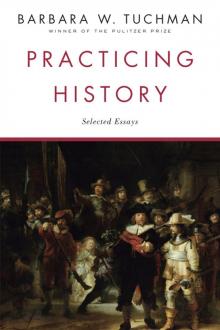 Practicing History: Selected Essays
Practicing History: Selected Essays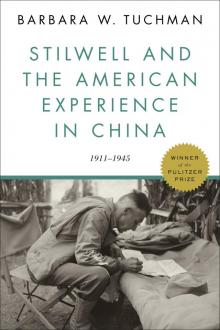 Stilwell and the American Experience in China, 1911-45
Stilwell and the American Experience in China, 1911-45 Bible and Sword: England and Palestine From the Bronze Age to Balfour
Bible and Sword: England and Palestine From the Bronze Age to Balfour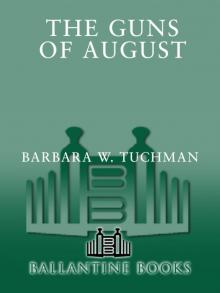 The Guns of August
The Guns of August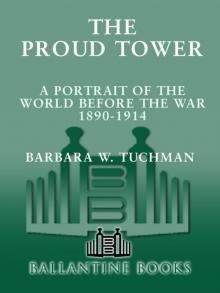 The Proud Tower: A Portrait of the World Before the War, 1890-1914
The Proud Tower: A Portrait of the World Before the War, 1890-1914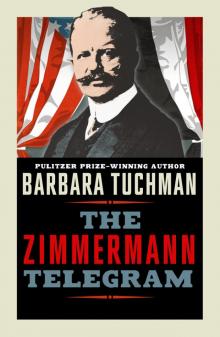 The Zimmermann Telegram
The Zimmermann Telegram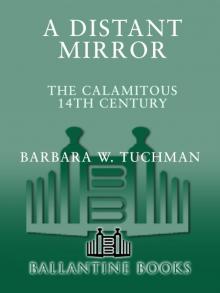 A Distant Mirror: The Calamitous 14th Century
A Distant Mirror: The Calamitous 14th Century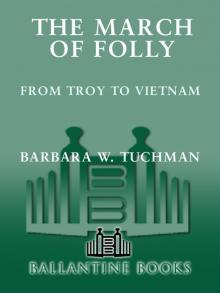 The March of Folly: From Troy to Vietnam
The March of Folly: From Troy to Vietnam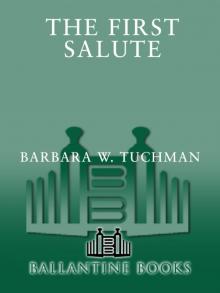 The First Salute
The First Salute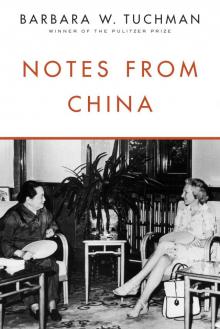 Notes From China
Notes From China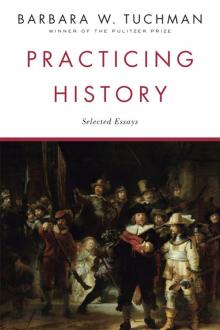 Practicing History
Practicing History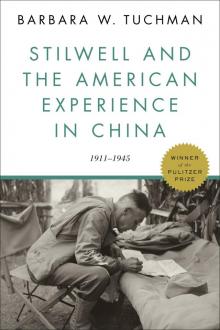 Stilwell and the American Experience in China
Stilwell and the American Experience in China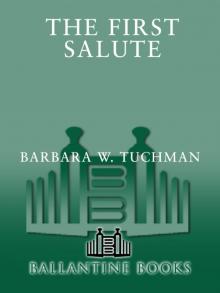 First Salute
First Salute Bible and Sword
Bible and Sword